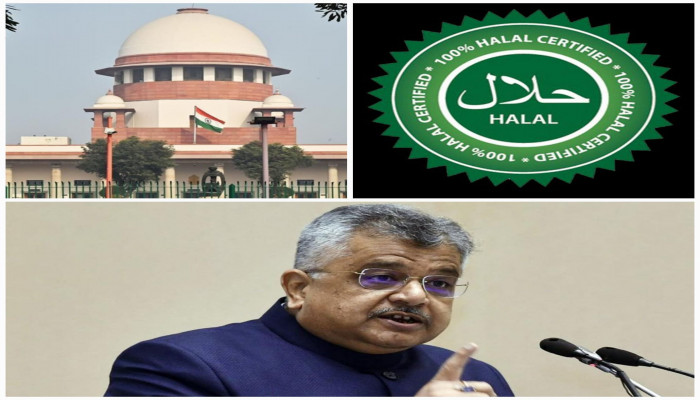UP govt questions Halal certification practices, asks SC ‘why non-believers should pay higher price’?
- In Reports
- 07:21 PM, Jan 21, 2025
- Myind Staff
Solicitor General Tushar Mehta, representing the Uttar Pradesh government, brought up the issue of halal certification for non-meat products during a hearing in the Supreme Court on Monday. He questioned why non-believers should have to pay higher prices for products that are halal-certified.
Mehta expressed he was “shocked” upon discovering that products beyond meat were being certified as halal, indicating that they meet the requirements of Islamic law.
He stated, “So far as halal meat is concerned, nobody can have any objection. But your lordships would be shocked, as I was shocked, that even cement and iron bars used are to be halal certified,” while addressing a bench of Justices BR Gavai and Augustine George Masih, as reported by news agency PTI.
Mehta went on to ask, “Even ‘atta’ (wheat flour) and ‘besan’ (gram flour) have to be halal-certified. How can ‘besan’ be halal or non-halal?”
Solicitor General Tushar Mehta made this statement before the Supreme Court on Monday. His remarks were made during the Supreme Court's hearing of the petitions challenging a government notification that prohibited the manufacturing, storage, sale and distribution of halal-certified food products within Uttar Pradesh, except those meant for export.
Mehta also stated that the halal-certifying agencies were charging for their services, and the total amount collected in the process could amount to several lakh crores.
The counsel representing the petitioners argued that the Centre’s policy considers halal certification a personal lifestyle choice. “All this is voluntary. Nobody is forcing anyone,” the petitioner's counsel stated.
In response, Solicitor General Tushar Mehta highlighted the issue for "non-believers" who do not consume halal-certified products, questioning why they should be made to pay a higher price simply because some individuals prefer halal-certified goods.
The Centre has filed an affidavit in this regard, and the Supreme Court bench has announced that. The Supreme Court has given the petitioners four weeks to file their counter-affidavits and said the matter would be in the week starting March 24.
On November 18, 2023, the Food Safety and Drug Administration of Uttar Pradesh issued a notification banning the “production, storing, distribution, and sale of halal-certified edible items” across the state.
This ban was enforced under the Food Safety and Standards Act of 2006 provisions.
"Halal" is an Arabic word roughly translated to "permissible" in English. According to the United Nations Food and Agriculture Organization (FAO), Halal Food is defined as food allowed under Islamic Law. A halal certification ensures that the food has been prepared by Islamic law and is unadulterated.







Comments